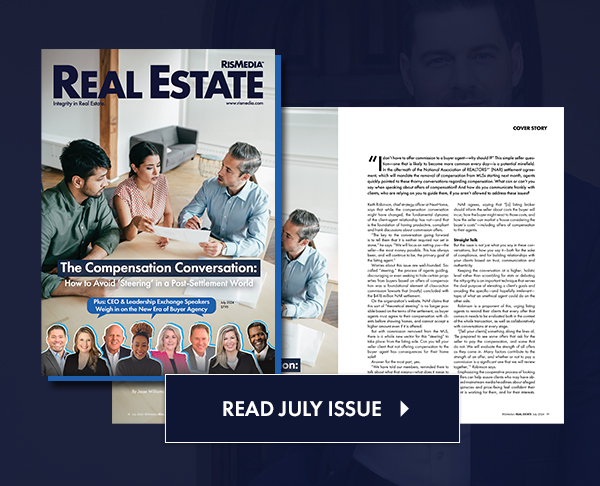“Real estate franchising in North America is totally broken,” says David Tedesco, owner and CEO of Realty Executives International.
Speaking to me between meetings at Tedesco’s 100,000-square-foot campus in North Scottsdale, he tells me that the real estate industry is in the very early stages of a major shift that’ll leave it looking quite different than what it is today.
Tedesco is not your average CEO. The technology entrepreneur got his start at just 15 years old, founding a software company when most kids his age were playing video games or out getting into trouble. Also the CEO and founding partner of True North Companies, Tedesco, now 42, has spent the last 20 years building the firm into a conglomerate that encompasses numerous healthcare, aerospace and entertainment brands. Tedesco was one of the early, pre-IPO investors in brands like GoPro and Tesla, so “business as usual” is clearly not his plan for the future.
After watching and researching the real estate franchise business for some time, Tedesco acquired Realty Executives International—the master franchisor of the Realty Executives brand—in April 2014.
Tedesco sat down with me to discuss what he sees as the future of real estate:
Paige Tepping: Why do you think the real estate franchising industry is broken?
David Tedesco: The real estate franchising industry in North America is terribly outdated. Over 30 years ago, brokers controlled the market through access to the MLS, and they generated leads by aggregating dollars and investing in traditional advertising channels on behalf of their agents. Today, almost every listing is available to the consumer via Zillow, Trulia and realtor.com®. Leads are generated directly by agents using social media, SEM (Search Engine Marketing) and through the big listing aggregators. The power in residential real estate is with strong agents and, increasingly, with teams. From my point of view, everyone who isn’t rebuilding their model around teams and away from big franchisor GCI (Gross Commission Income) fees is a dinosaur.
PT: If this is the case, why isn’t everyone adapting their business models accordingly?
DT: In my opinion, when it comes to the big franchisors, many simply can’t. Somewhere around 250,000 agents go to work at models where they send a substantial portion of their earnings on to the franchisor of their brand. Most of those franchisors are public companies with hundreds of millions—or billions—of dollars of debt. They have a quarterly number they have to hit in order to keep Wall Street happy, keep their jobs, and earn a profit on their stock options. Being a public company makes transitioning to a different, lower cost revenue model nearly impossible.
Take Blockbuster for example. Why did they go bankrupt instead of becoming Netflix? Because Netflix was going to be a fundamentally worse business financially than Blockbuster’s retail model for a rather long time, even though it was clearly going to be the winning long-term model. So they kept the money flowing at the expense of leading the next generation of innovation. It’s the classic innovator’s dilemma.
I think the same thing is true for the big, public franchisors today. They get away with charging very high fees to a group of brokers and agents who continue to pay them, but we can’t figure out why. Perhaps because they always have. Certainly the days of the broker taking a 50 percent split are almost entirely gone; those sorts of splits are now reserved for team leaders who create value via lead generation and development. If broker/owners have had to rationalize their fees, why haven’t the big franchisors?
PT: How do you think this is going to play out?
DT: I see franchisors either having to move away from the GCI models or shrink, because there’s no compelling value proposition to buy into them anymore. In fact, if you look at the data for U.S. and Canadian brokerages, you’ll see that it’s already happening. When you unpack the data (which are available to anyone with the inclination to look, as many of the big franchisors are public companies), what you’ll see is growth coming from overseas markets and acquisitions, not domestic organic growth.
Interestingly, many of the new, venture capital-funded brands seem to be following the same model, spending huge sums to acquire brokerages or to sign high-profile agents. That makes little sense to us. We think that if you have to pay people to be your customer, and make no mistake, that’s exactly what’s occurring, then your value proposition is fundamentally flawed. I can’t remember the last time Apple paid me to use an iPhone over an Android phone, or Google paid me to search via Google rather than Yahoo!.
PT: Do you think franchisors are going to go away completely?
DT: Change, yes, but go away? No. The reality is that most brokerages, or almost all teams, are relatively small businesses. The cost and time involved in building and establishing a recognizable brand is incredibly high. The challenge of selecting and managing a disparate group of disintegrated technology solutions is also high. There are serious economies of scale to be gained by working with a franchisor who offers a great brand, marketing, training and turnkey technology solutions—as long as they’re offered at a reasonable price and on flexible terms.
PT: What are you doing at Realty Executives to prepare for these market changes?
DT: We’ve spent the last two-and-a-half years rebuilding the company. We’ve replaced 100 percent of senior management, developed all of our own proprietary technology, refined our brand, and become maniacal about customer service. We’ve laid the foundation to support our vision for the next 20 years.
We acquired Realty Executives because we felt the brand was a great value and has always stood, strategically, for the same value proposition we believe will win going forward. However, prior to our acquisition, execution at the company was lacking. Realty Executives was a major disruptor when it was first started over 50 years ago, but management at International lost sight of that. However, the brand remained strong, mostly through the efforts of some pretty incredible franchisees and broker/owners. So rather than start from scratch and spend hundreds of millions of dollars establishing a new brand, we decided to execute our brand strategy via an existing brand that was originally built around the same disruptive, entrepreneurial spirit necessary for success today.
We’re much more nimble and forward-thinking than we were in the past. We’re flexible, inexpensive, and have technology equal to or better than anything out there. We’re continuously making investments in new tech and have built a system that’s focused on delivering tools that best support the most productive real estate agents in the country. And as a part of the much larger True North Companies, we’re very strong financially and totally debt-free.
PT: Is it working?
DT: If you look at the numbers, it is. All big brands claim to do a lot of business, advertising, etc., but the data say otherwise.
We’re in the 86th percentile for agent productivity, but at a third the cost of our direct competitors. Other brands talk about their advantages—tech, leads, branding, training—and these are all important elements of what a franchisor offers; however, I’ve learned over the years that while a good sales pitch is great, numbers always tell the real story.
To anyone considering renewing a franchise agreement, I have one question: What we deliver supports over 8,000 people across the U.S. and Canada and domestically we average in the top 14 percent in terms of productivity; so why pay two to four times the fees to a company whose agent productivity is almost certainly lower? If you pay more, you ought to get more. Where’s the value?
PT: So, what would you say is the specific value that Realty Executives brings to these franchisees?
DT: There are two operative models in the market right now: the ultra-inexpensive, low brand equity model, which typically aggregates huge agent counts under very large brokerages, with very low per-agent productivity; and the old school brands running a fee-heavy model that costs two to three times as much.
Now, it’s worth saying, residential real estate is a truly massive market and there are going to be many different brands serving many different types of agents, both now and in the future. The ultra-inexpensive models can make sense for part-timers who are fine with giving up the benefit of associating with a large, premium brand. And many established agents and brokers will stay with ultra-inexpensive models simply to avoid the hassle and fear associated with a change.
We think the interesting space is premium brands willing to offer services on high-value terms—something the market has resisted. That’s where we’re focused: We offer a dynamic set of proprietary tools and integrated technology. Our flexible franchise agreement offers the freedom to operate your business the way you want to. Our customer service is No. 1 in the industry. Our turnaround time is a fraction of the industry average, and we provide features like live chat to ensure people can engage with us the way they want.
PT: Stepping back from Realty Executives, how big is your overall business?
DT: About 15,000 people go to work under our brands every day. We have 1,100 locations, offices and retail facilities throughout North America.
PT: So it sounds like Realty Executives is just a part of a bigger enterprise?
DT: Yes, but we have big expectations for Realty Executives because of the shifts occurring in this market. We own our companies; we’re not subject to the short-term mentality of Wall Street, and we’re debt-free. We’re playing the same long game that our franchisees and agents are.
PT: You seem to be a risk-taker. How do we know you’re going to still be around in a few years?
DT: I get that question a lot. We’re entrepreneurial and we try a lot of different things. We’re not a super-careful, risk-averse group. We make mistakes; however, we have a diverse group of companies that are very profitable. We often generate more cash than I can invest effectively. As a result, we don’t buy businesses to sell them, but rather, to hold them long-term. That’s the huge difference between us and most professional investment and private equity firms out there.
And on a personal note, I have three young daughters and another one on the way. I take risks at work, not with my body—at least not much anymore.
PT: Do you have any closing thoughts to share?
DT: It might seem funny to say it, but our brand actually makes sense. In my opinion, most of the big brands in our industry mean nothing—they’re just the last names of people you don’t know and will never meet. To me, that seems like a bizarre approach to brand development. Imagine if Uber had decided to call themselves Anderson. They probably wouldn’t have received a single round of capital from a professional investor. So why build your brokerage or team around a meaningless name?
Realty Executives is self-referencing and self-explanatory. It actually means something relevant. It’s positive and it’s premium. We’ve been around for over 50 years and have huge brand equity throughout North America.
We look around and don’t see many of our competitors committing to major change, or really preparing for what’s coming next. From my point of view, most of our competitors spend their resources wooing and buying high-end baby boomer agents in order to get a share of their GCI. Great. Have fun! Hope that works out. We think the future is a much leaner, value-focused model targeting the incoming millennial generation of REALTORS®, brokers and teams. We bring an outsider’s view to this industry and we think that’s a major strength. We don’t see the future through the eyes of those who have been mired in the status quo.
For more information, please visit www.RealtyExecutives.com.
For the latest real estate news and trends, bookmark RISMedia.com.












